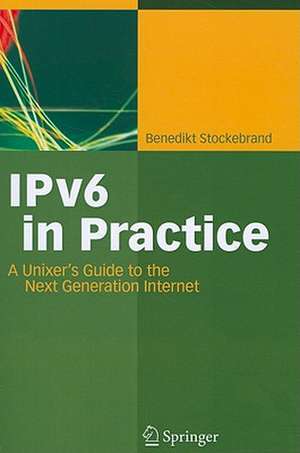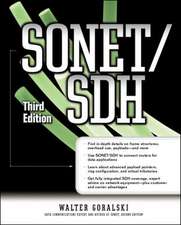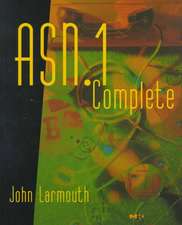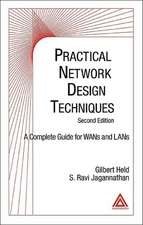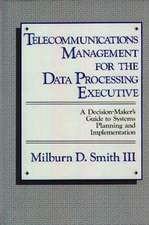IPv6 in Practice: A Unixer's Guide to the Next Generation Internet
Autor Benedikt Stockebranden Limba Engleză Paperback – 12 feb 2010
This book is a practical guide to IPv6 addressing Unix and network administrators with experience in TCP/IP(v4) but not necessarily any IPv6 knowledge. It focuses on reliable and efficient operation of IPv6 implementations available today rather than on protocol specifications. Consequently, it covers the essential concepts - using instructive and thoroughly tested examples - on how to configure, to administrate, and to debug IPv6 setups. These foundations are complemented by discussions of best practices and strategic considerations aimed at overall efficiency, reliability, maintainability, and interoperation.
The examples in this book cover all relevant aspects concerning Debian GNU/Linux, FreeBSD, and Solaris. Examples about other Unix derivatives are available online at www.benedikt-stockebrand.de.
| Toate formatele și edițiile | Preț | Express |
|---|---|---|
| Paperback (1) | 338.68 lei 6-8 săpt. | |
| Springer Berlin, Heidelberg – 12 feb 2010 | 338.68 lei 6-8 săpt. | |
| Hardback (1) | 347.26 lei 6-8 săpt. | |
| Springer Berlin, Heidelberg – 13 oct 2006 | 347.26 lei 6-8 săpt. |
Preț: 338.68 lei
Preț vechi: 423.35 lei
-20% Nou
Puncte Express: 508
Preț estimativ în valută:
64.83€ • 70.44$ • 54.49£
64.83€ • 70.44$ • 54.49£
Carte tipărită la comandă
Livrare economică 21 aprilie-05 mai
Preluare comenzi: 021 569.72.76
Specificații
ISBN-13: 9783642063886
ISBN-10: 3642063888
Pagini: 416
Ilustrații: XXII, 390 p. 50 illus.
Dimensiuni: 155 x 235 x 22 mm
Greutate: 0.59 kg
Ediția:Softcover reprint of hardcover 1st ed. 2007
Editura: Springer Berlin, Heidelberg
Colecția Springer
Locul publicării:Berlin, Heidelberg, Germany
ISBN-10: 3642063888
Pagini: 416
Ilustrații: XXII, 390 p. 50 illus.
Dimensiuni: 155 x 235 x 22 mm
Greutate: 0.59 kg
Ediția:Softcover reprint of hardcover 1st ed. 2007
Editura: Springer Berlin, Heidelberg
Colecția Springer
Locul publicării:Berlin, Heidelberg, Germany
Public țintă
Professional/practitionerCuprins
Getting Started.- A Quick Overview of IPv6.- Preparing for IPv6.- IPv6 Address Basics.- Address Configuration.- IPv6 and the Domain Name System (DNS).- Essential Network Services.- Unicast Routing Basics.- IPv4/IPv6 Interoperation.- Interoperation Concepts.- Application Level Gateways.- Protocol Translation.- Tunnels and Related Topics.- Tunnel Basics.- IP-in-IP Encapsulation.- Other Tunneling Methods.- Advanced Tunneling Issues.- The Point-to-Point Protocol (PPP).- Additional Base Features.- More on Addresses.- Advanced Routing with Quagga.- Multicasts Beyond the Link-local Scope.- The Dynamic Host Configuration Protocol (DHCPv6).- Bridging the DNS Gap.- New Functionalities.- IP Security (IPsec).- Mobile IPv6 (MIPv6).- Quality of Service (QoS).- Architectural and Operational Topics.- Renumbering Procedures.- Multi-homing.
Recenzii
From the reviews:
"The focus of the book is clear: to give the reader step-by-step guidance on the setup of all the major functions surrounding the installation and use of IPv6 on Unix Systems. … This book is definitely targeted at those who want to learn how to use IPv6. Therefore, not only large network administrators and academics may be interested, but also small office/home office (SOHO) network administrators and enthusiastic techies. These readers will surely find the solution to their needs inside this convenient and practical book." (Damien Magoni, ACM Computing Reviews, Vol. 49 (5), 2008)
"The focus of the book is clear: to give the reader step-by-step guidance on the setup of all the major functions surrounding the installation and use of IPv6 on Unix Systems. … This book is definitely targeted at those who want to learn how to use IPv6. Therefore, not only large network administrators and academics may be interested, but also small office/home office (SOHO) network administrators and enthusiastic techies. These readers will surely find the solution to their needs inside this convenient and practical book." (Damien Magoni, ACM Computing Reviews, Vol. 49 (5), 2008)
Textul de pe ultima copertă
Handling IPv6 for the first time is a challenging task even for the experienced system administrator. Even though IPv6 is in many ways simpler, more reliable, and easier to operate than today’s IPv4, its new concepts and mechanisms make it necessary to rethink a number of well-established methods and practices.
This book is a practical guide to IPv6 addressing Unix and network administrators with experience in TCP/IP(v4) but not necessarily any IPv6 knowledge. It focuses on reliable and efficient operation of IPv6 implementations available today rather than on protocol specifications. Consequently, it covers the essential concepts - using instructive and thoroughly tested examples - on how to configure, to administrate, and to debug IPv6 setups. These foundations are complemented by discussions of best practices and strategic considerations aimed at overall efficiency, reliability, maintainability, and interoperation.
The examples in this book cover all technologically relevant aspects concerning Debian GNU/Linux, FreeBSD, and Solaris. Examples about other Unix derivatives are available online at www.benedikt-stockebrand.de.
This book is a practical guide to IPv6 addressing Unix and network administrators with experience in TCP/IP(v4) but not necessarily any IPv6 knowledge. It focuses on reliable and efficient operation of IPv6 implementations available today rather than on protocol specifications. Consequently, it covers the essential concepts - using instructive and thoroughly tested examples - on how to configure, to administrate, and to debug IPv6 setups. These foundations are complemented by discussions of best practices and strategic considerations aimed at overall efficiency, reliability, maintainability, and interoperation.
The examples in this book cover all technologically relevant aspects concerning Debian GNU/Linux, FreeBSD, and Solaris. Examples about other Unix derivatives are available online at www.benedikt-stockebrand.de.
Caracteristici
Thorough presentation of the new internet protocol IPv6 Based on available IPv6 implementations The essential concepts on how to configure, administrate, and debug IPv6 setups Focuses on reliable and efficient operation of IPv6 Uses instructive and thoroughly tested examples Includes supplementary material: sn.pub/extras
